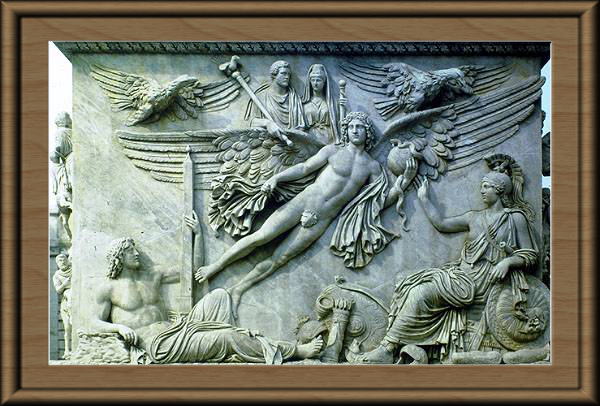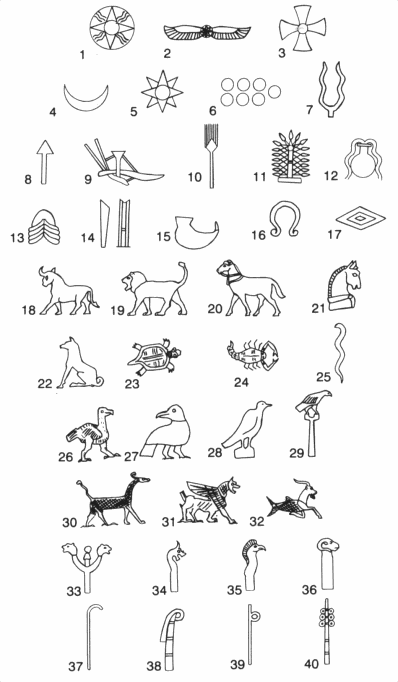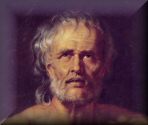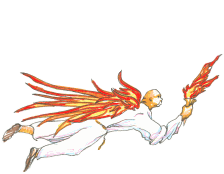Zeus, Hera and Athena
This is another commonly cited 'pagan trinity.' As with most, it's a random
assemblage of three gods. This is a 'blended' family; Zeus and Hera are
husband and wife, but Athena is not Hera's daughter. The history of this
family is dysfunctional in the extreme, featuring cannibalism and incest:
"Later, Kronos forced himself upon Rheia,
And she gave birth to a splendid brood:
Hestia and Demeter and gold-sandalled Hera,
Strong, pitiless Hades, the underworld lord,
The booming Earth-shaker, Poseidon, and finally
Zeus, a wise god, our Father in heaven
Under whose thunder the wide world trembles.
"And Kronos swallowed them all down as soon as each
Issued from Rheia's holy womb onto her knees,
With the intent that only he among the proud Ouranians
Should hold the title of King among the Immortals."
Rheia craftily substituted a stone for infant Zeus, a substitution which
Kronos failed to notice:
"She came first to Lykos, travelling quickly by night,
And took the baby in her hands and hid him in a cave,
An eerie hollow in the woods of dark Mount Aigaion.
Then she wrapped up a great stone in swaddling clothes
And gave it to Kronos, Ouranos' son, the great lord and king
Of the earlier gods. He took it in his hands and rammed it
Down into his belly, the poor fool! He had no idea
That a stone had been substituted for his son, who,
Unscathed and content as a babe, would soon wrest
His honors from him by main force and rule the Immortals."
Athena continues the family tradition of abnormal births, springing fully
formed from Zeus' forehead, clad in battle armor:
"Now king of the gods, Zeus made Metis his first wife,
Wiser than any other god, or any mortal man.
But when she was about to deliver the owl-eyed goddess
Athena, Zeus tricked her, gulled her with crafty words,
And stuffed her in his stomach, taking the advice
Of Earth and starry Heaven...
From his own head he gave birth to owl-eyed Athena,
The awesome, battle-rousing, army-leading, untiring
Lady, whose pleasure is fighting and the metallic din of war."
(Hesiod, Theogony)
This blended family is a typical 'pagan trinity,' a pick-up team of three
gods selected more or less at random, possibly on grounds these three were
for some the principal deities of the pantheon. Needless to say, no pagan
ever described this assemblage of three gods as One God in three persons.
One of many variants is 'Zeus, Athena and Apollo' (Jupiter, Minerva and Apollo). Is Athena, a virgin
goddess with no offspring, now become Apollo's mother? Or is it enough just to be friends?

At Random
As the reader will have noted, most 'pagan trinities' are a random assemblage
of three gods. The random character of these assemblages is brought out
by the freedom with which gods may be substituted. Is the Egyptian 'trinity'
Isis, Osiris and Typhon? Or Isis, Osiris and Horus? Whichever you like,
provided you gather together a bundle of three. The following table is
truncated from the Biblical Apostolic Organization's web-site:
| First Person |
Second Person |
Third Person |
| Father, King |
Son, Prince |
Mother, Queen |
| |
Triad of Babylon |
|
| Nimrod |
Tammuz |
Simerimas |
| Shamash |
Sin |
Ishtar |
| |
Triad of Egypt |
|
| Osiris |
Horus |
Isis |
| |
Triad of Greece |
|
| Zeus |
Apollo |
Athena |
| |
Triad of India |
|
| Brahma |
Vishnu |
Shiva |
| |
Triad of Rome |
|
| Jupiter |
Mars |
Venus |
| |
Triad or Trinity of Roman Catholicism |
|
| Father |
Son |
Spirit-Mother |
How thoughtful that the Babylonians are helpfully supplied with two different
'trinities' from which to choose! And the "Trinity of Roman
Catholicism" has been 'improved' to 'Father, Son, and
Spirit-Mother,' lest otherwise no resemblance be perceived between
the Holy Spirit and the pagan ladies who share the third column. How those
Catholics who call Mary 'the spouse of the Holy Spirit' will deal
with these developments is unknown.
Notice especially the 'trinities' labelled
as 'Greek' and 'Roman.' The Romans, like the modern Japanese, were
gifted at incorporating and making their own things invented
elsewhere. Since they lacked poetry praising the gods comparable to
Homer's epics, they took over the Greek stories. Same stories, same
gods: the Roman gods have Latin names rather than Greek, but
otherwise match up perfectly with the Greek gods. The Roman pantheon was modeled after the Greek,
yet the two 'trinities' supplied by the Biblical Apostolic Organization are comprised of a different
set of gods: the Greeks get Zeus (Jupiter), Apollo and Athena (Minerva),
while the Romans have Jupiter (Zeus), Mars (Ares) and Venus (Aphrodite).
How can one and the same population of gods yield
so many different 'pagan trinities,' if the 'trinity' is not in
the eye of the beholder?
Although the editors identify the 'third person' of the 'trinity'
as "Mother, Queen," the virgin Athena was no more the
mother of Apollo than Aphrodite was the mother of her lover Ares, nor was
either one Zeus' "Queen," Hera (Juno). If the intent is for the
party in the third column to be the mother of the party in the
second column, then why not enter Latona or Leto, Apollo's mother,
in the third column? How hard could that be? The 'Days of Our
Lives' character of the pagans' story-telling about their divinities
ensures plenty of connections amongst this cast of characters, if any old connection will do: mother, lover,
colleague, friend, business partner.
Thus you can manufacture as many of these 'pagan trinities' as you please, by gathering together
three gods at random.
As before, the process of generating 'pagan trinities' works like
so: a.) Redefine the 'trinity' to mean 'three of something,
anything;' b.) Find three of something, somewhere, anywhere, and you
have a 'pagan trinity.' Find three more, and you have another 'pagan
trinity.' It is as if grocery shopping were discovered to be the
underlying cause of trinitarianism, because the shopper's purchases
may be sorted and counted as, one carton of milk, one chicken, two
peaches, a dozen eggs...and THREE oranges! The error made here is
selection bias. Though 'three' is not the shopper's only choice, nor
even the preferred choice, nor even a common choice, the occasional
'three' of something, anything, is imagined by the observer to hold
special significance. But the significance is to the observer, who
is looking for 'three,' not to the shopper, who was looking for
groceries.

Jupiter, Mars and Venus
To find a real resemblance, it would help to find some point of
similarity in the elements. Let us examine our alternating Graeco-Roman pagan 'trinity.' Jupiter (Zeus) is the
only element common to both; the Roman version, as listed above,
includes Mars and Venus. Mars (Ares) was the god of war:
"'Ares, Ares, manslaughtering, blood-stained, stormer of strong walls, shall we not leave the Trojans and
Achaians to struggle after whatever way Zeus father grants glory to either, while we two give ground together and avoid Zeus'
anger?" (Homer, Iliad, Book Five, 30-35).
This G-rated web-site cannot explain Aphrodite's generation in detail,
except to pick it up at this point:
"...and in that foam a maiden developed and grew. Her first approach
to land was near holy Kythera, and from there she floated on to the island
of Kypros. There she came ashore, an awesome, beautiful divinity...Eros
became her companion, and ravishing Desire waited on her at her birth and
when she made her debut among the Immortals." (Hesiod, Theogony, 195-203).
In the familiar 'pagan trinity' pattern, no resemblance can be discerned
between this threesome and the Christian trinity.

Diana
'Triform' Diana is the moon: "O virgin, protectress of the
mountains and the groves, thou three-formed goddess. . ." (Horace, Book
III, Ode XXII). Her three forms, or faces, are the various phases of
the moon as she completes her monthly circuit: "Around the pyre stood altars, and the priestess, Hair
unbound, called in a voice of thunder Upon three hundred gods, on
Erebus, On Chaos, and on triple Hecate, Three-faced Diana.
(Virgil, Aeneid, Book IV, Robert Fitzgerald translation, p. 114). She's a favorite of pagan Trinity spotters:
"The Diana of the Romans is stamped on a medal, as having three faces
or three distinct heads, united to one form. On the reverse is the image
of a man, holding his hand to his lips; under whom is this inscription:
‘Be silent; it is a mystery.’"
(Charles G. Finney, Lectures on Theology, Lecture XVII)
Calendar publishers like to represent the moon's waxing and waning, a continuous
process, by four stages, five stages, six stages, but three is the bare
minimum. This again is a modalist paradigm, because, as even the pagans
realized, it is one and the same moon which appears now full, now crescent, now new.
So why would a Christian theologian resort to triform Diana?
Charles Finney, like Hislop, was a trinitarian. Paul said that the
pagans knew God:
"For the invisible things of him from the creation of the world are clearly seen, being understood by the things that are made, even his eternal power and Godhead; so that they are without excuse:
Because that, when they knew God, they glorified him not as God, neither were thankful; but became vain in their imaginations, and their foolish heart was darkened."
(Romans 1:20-21).
Some readers assume that, for this to be true, the pagans must have a
perfectly adequate conception of God. They find what they think they are
obliged to find.
Certain truths of Christian theology, like the existence of God, the unicity of
God, and the creation of the world, can be demonstrated by reason alone, without resort
to God's self-revelation in scripture. Like other disciplines,
natural theology seeks to enlarge its sphere; but the doctrine of the Trinity
remains a 'bridge too far.' No convincing proof of God's triunity has ever
been advanced from reason alone; this is a truth known only because revealed by God.
In order to show that, say, 'Fermat's Last Theorem' is a truth that can
be discovered by reason alone, it is not necessary to dredge up some lost
tribe which has explicated the theorem. It would help, though. Logic does
not make this demand...though rhetoric does. There is
considerable 'sales resistance' to the notion that truths about God known
only to Christians are discoverable by unaided reason. If that's so, why
do none outside know these things? Christians have not cornered the market
on reason. It helps to overcome the reader's skepticism if some pagan can
be found, like Plato, who does know that an uncreated God created the world. This approach meets a brick
wall in the trinity, because there isn't any pagan who knows that God is triune.
The detritus that has piled up from the unsuccessful effort to move the
trinity into the sphere of natural theology includes triform Diana and
her peers. Those who first advance these likenesses often do so with proper
humility, describing them as "intimations." In fact there is
no meaningful resemblance between the living God and the shape-shifting moon. Turning the equation around taxes these
"intimations" past the breaking point, because no one could possibly
arrive at the Christian understanding of a God who ever is, was, and will
be Father, Son and Holy Spirit by watching the moon turn from crescent
to full and back again.

Bus Herds
Urban dwellers are perplexed by the commonly-noted
phenomenon, that there are, on average, more buses going the other way than your
way. If you wait patiently for the south-bound bus at a stop on Elm Street,
and count all the buses going north versus the buses going your way, over time, the
north-bound count will always outnumber the south-bound count. Is life
unfair? Not really; there is a very strong constraint limiting the number of
buses you will see going your way -- namely, there will always only be one,
because you will get on the first bus going your way, not waiting to see any
others. On the other hand, there could be zero buses, one bus, or whole
herds of buses going the other way. There is a severe constraint on
south-bound buses seen: they are always limited to one, versus no constraint on
north-bound buses: there can be any number of them.
It's like that with pagan pantheons. The Jehovah's
Witnesses and 'Oneness' Pentecostals helpfully supply pagan ornaments
depicting 'three gods', thus, they imagine, 'explaining' the Trinity. This
'explanation' flies over time and space, ranging from the isolated
Incas to Ossian's Celtic dreams. Never mind for the moment that the Trinity is not 'three
gods!' Groupings like Jupiter, Juno and Minerva, or Isis, Osiris and Set are
supposed, according to these Trinity-seekers, to represent an inherent
'triadic tendency' in paganism.
But wait -- in 'discovering' triads like Jupiter, Juno
and Minerva (a blended family -- Minerva is related to Jupiter but not Juno), our
Trinity-discoverers have leaped right over amorous duos like Venus and Mars, and have
also overlooked larger groupings, like the twelve Capitoline gods. And wait --
Jupiter has lots of other children besides Minerva; why carve out this little nuclear
family from all the other siblings? In fact, the only reason anyone has
'discovered' this 'triad' is because someone went looking for a group of 'three
gods', ignoring all other groupings.
Is three significant? Of course! "He [Pythagoras] likewise
ordained that men should make libations thrice, and observed that
Apollo delivered oracles from the tripod, because the triad is
the first number." (Iamblichus, Life of Pythagoras, p. 58). But
how splendid is four! People who are into number mysticism find meaning in
all of the numbers between one and ten, so they could hardly omit
'three' from their treasure-chest of significant numbers. What about
'six:' "That sacrifices also should be made to Venus on the sixth day,
because this number is the first that partakes of every number, and,
when divided in every possible way, receives the power of the numbers
subtracted and of those that remain." (Iamblichus, Life of Pythagoras,
p. 58). And you should hear about 'eight'. . .not to mention 'ten,' the
very best of all: "That is why they called Ten a perfect number, the
most perfect of all, as comprehending all difference of numbers,
reasons, species and proportions." (Porphyry, Biography of Pythagoras,
Chapter 52, p. 136, Pythagoras Sourcebook and Library, Kenneth Sylvan
Guthrie).
The Pythagorean Ion of Chios is quoted as saying, "All things are
three, and there is nothing more or less than this three." This
gives us both more and less than is needed, however, as trinitarians
are not people who say that "all things are three." Whatever he
meant by this saying, and it is certainly on a different level than
the usual 'any random god count of three is a trinity,' it does not
actually match up with Christian belief about God. "All things" are
not in view.
It's easy enough to find groups of three gods — the natural triad of sky,
earth and sea evokes in pagan minds a triad of deities. The pagan
gods were energetically heterosexual, and mommy and daddy and baby make
three. But wait: while pagan divine parenthood could present unusual
risks of child mortality, the grand-parent generation, the Titans, not
having outgrown the brutish habit of eating the young, in happy times families
could grow. The only reason to find nothing but 'triads' is if you're
looking for nothing but triads. Just as the party guests sort themselves
out into little cliques of two, three, four, or five, no number being 'prohibited',
pagan gods could sort themselves out into trios as well as duos and quartets.
But they show no tendency to favor that number; it's only the wild-eyed
enthusiasts looking for 'triads', and discarding any number other than
the one sought, who 'find' any 'triadic tendency' in pagan pantheons.
The new religious movements search the South Seas, homing in
on some obscure lost island on which squats a 'three-headed idol.' Yet one can
'dial up' a pagan deity with any number of heads you please: the two-headed Janus,
the hundred-headed Typhon, etc. They discard those...because that's
not what they're looking for! The only reason to find 'triads' in pagan
pantheons is if one is constrained to find 'triads' by the initial conditions of the search.

|











